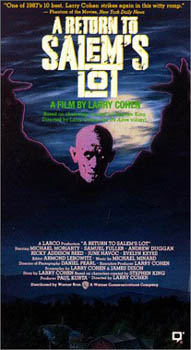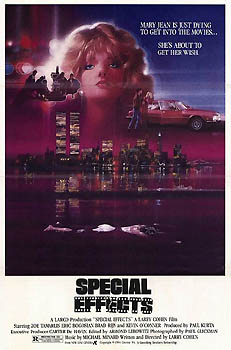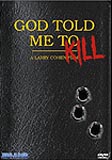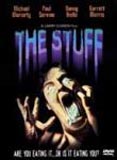













Larry Cohen is the ultimate guerrilla filmmaker, the master of genre fusion, and exponent of schlock horror and science fiction with a social conscience. And he was making Blair Witch style hits when the Blair Witch kids were still in nappies. In a career spanning four decades, Larry Cohen has made some of the most daring cult films to come out of America. He proudly accepts the high praise but remains humble and perhaps even a little overly modest about his place in film history. However, the source of such adulation for this writer/director/producer is simple. It's his amazing ability to create and bring to the screen extraordinarily original ideas.
Cohen is a true auteur, always working with small budgets to encourage spontaneity and innovation. He mixed the police thriller genre with science fiction two decades before anyone had even heard of The X Files or Men In Black. He's also in the habit of tackling virtually every major issue of concern in American society since the 50's by employing giant flying serpents, man eating mutant babies and killer ice-cream to get the message across loud and clear.


It's almost ironic then, that for someone who has so adamantly fought for autonomy and independence in his craft, he not only holds no contempt for the Hollywood Studio system, but also freely admits that his inspiration to make films stems from a childhood fascination with the musicals and hard-boiled melodramas churned out by the Warner Brother Studios in the 1940's.
God Told Him to... The Larry Cohen Interview
by Chris Chamberlin
CC: Take us right back to the beginning. You always knew you wanted to be a filmmaker but how did you manage to get your first feature film made?
LC: "Well, by the time I got around to directing a picture I'd already written many television shows and created a couple of series like The Invaders. It's easier to move into directing when you've already had some degree of success and you know people. (laughs) I think I told the people who gave me the money to make the first movie that if they didn't get their money back, I'd write them a free script or something. They didn't get their money back, but I never did write them their free script either. But my first film was Bone. It's a very good movie but not that often seen. Then Black Caesar was my second picture and that was a number one box office hit. It was a phenomenon in those days for a low budget picture to break out. And my third picture, It's Alive was also a huge hit and got to be number one, similar to what's happening now in America with The Blair Witch Project."



CC: One of the highlights at the Brisbane International Film Festival this year was the opportunity to see the It's Alive trilogy back to back on the big screen. There were some filmic devices that you pioneered in the first one wasn't there?
LC: "Well I think that was the first time that anybody had shown the monster's point of view. Later on it became identifiable with Jaws, because you don't see the shark for the first half of the movie, you just see its point of view. We also used that thing with flashlights that we open the picture with - multiple flashlights coming on and sweeping the screen and sweeping through the darkness looking for the creature. That was very similar to what was done in ET and many other films since. I like to think that we had some influence on other filmmakers and I'm always surprised when I run into some famous filmmaker who tells me how much they enjoyed my films. James Cameron's a big fan of Q: The Winged Serpent and The Stuff; Spielberg gave us an award for God Told Me To when he was a judge at one of these film festivals; and It's Alive got a critics award from a festival that was chaired by Roman Polanski. So although these are B movies, it's nice to run into all the A Directors who always talk about these pictures."
CC: Since we're talking about filmmakers, let's talk about your own approach. How much of your movies are meticulously prepared and how much is left to improvisation and on the spot decision making?
LC: "Well I prepared them all but then since I was the boss and I could do anything I wanted, I just changed everything that I felt like changing as I went along. I didn't have to call anyone and ask permission. Since I was the writer and also the producer and director, if I came upon a location or I found out something about an actor that I didn't know before, I could write it into the script. When we did Q, originally the Michael Moriarty character was not a piano player or an aspiring performer, but I found out on the first day of the shoot that he was very musical. So I wrote that into the part, which I feel in the end gave the character much more depth. It was just by chance that I happened to find that out about him."
CC: Jim Jarmusch once said that independent filmmaking is a lot like gambling. Perhaps that's an example of what he meant.
LC: "Well you do take chances all the time and you always have to congratulate yourself at your luck for having got through the scene and got out of there having actually got the picture that you intended to get without anything going wrong. In many cases you get something better than what you expected. Like when we got to the top of the Chrysler Building [when shooting Q], we found these baskets were up there the steeplejacks who clean and repair skyscrapers used. I said 'maybe we could put guys with machine guns in those baskets. Let's write them into the movie.' So we hired the steeplejacks and we put them in police uniforms because they weren't afraid to go out there and we had them in the baskets firing at this imaginary beast that was flying around. Those are the kind of accidents that occur that you never could have planned ahead of time and when you see it, you've got to be able to work quickly and integrate it into the film. When we shot It's Alive we shot in the storm drains of LA and it looked like it was gonna rain, but fortunately we managed to get the scenes and get out of there just before the rain came. So again, as Jarmusch says, it's always a gamble."
CC: You've written 36 produced screenplays and directed 19 of those. Of the ones you passed on, is there any particular movie that in hindsight you wish you'd directed yourself?
LC: "Well, I would have liked to have done all of them. It's just a matter of, if you can't get the freedom to make your picture the way you want to make it, you don't want to be in the situation where someone is looking over your shoulder every minute. I'd rather let somebody else direct it and go on and write another script, which is an opportunity to express myself freely rather than have to be part of a committee. So if I see that I can't possibly make it work with other people I just go on, let them make the picture, take the money and go write something else."
CC: Does it get easier or harder to come up with all these ideas as time goes on?
LC: "I've never had more ideas than I got now. I just sold a script to 20th Century Fox, called The Phone Booth. The whole movie takes place in a telephone booth, and we're getting a lot of interest from big, big actors; some of the biggest stars in the business. So I hope that'll be a big picture."
CC: So what contemporary filmmakers and films have impressed you?
LC: "I thought that Pulp Fiction was a break-out movie and everyone's copied that picture since then. One of my favourite movies is Chinatown with Jack Nicholson - that's one of the best at that genre of movie that's ever been made...and Rosemary's Baby. They're two pictures that Polanski made that were really superb. That was it, I mean he hasn't done anything since, but he made two great movies. And oddly enough he made them both as part of the Hollywood Studio system with Paramount."
CC: So you obviously think that there's some movies that don't necessarily suffer from being part of the studio system.
LC: "Yes. I think he got a lot of help from having made the studio pictures. None of his other pictures were ever quite as perfect as those two movies. And I guess I also like the director Michael Curtiz (Casablanca), who was a big director at Warner Brothers."
CC: So what can we expect from you in the near future?
LC: "Well, as you can see I'm still crazy making movies that happen in phone booths and things like that. I've got more ideas than I've ever had. I'll probably write something on my way back from Australia on the plane. I don't mind flights, I usually wish the flight was longer. (laughs) When I get there I say 'Oh no, don't let it land yet, I have to finish this scene.'"
